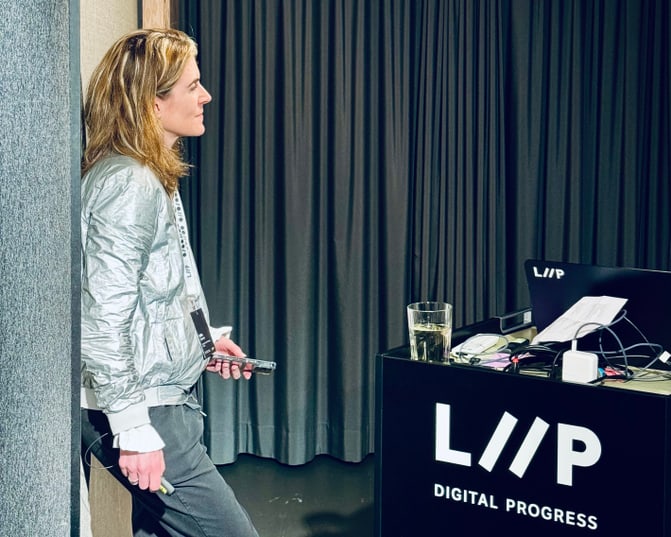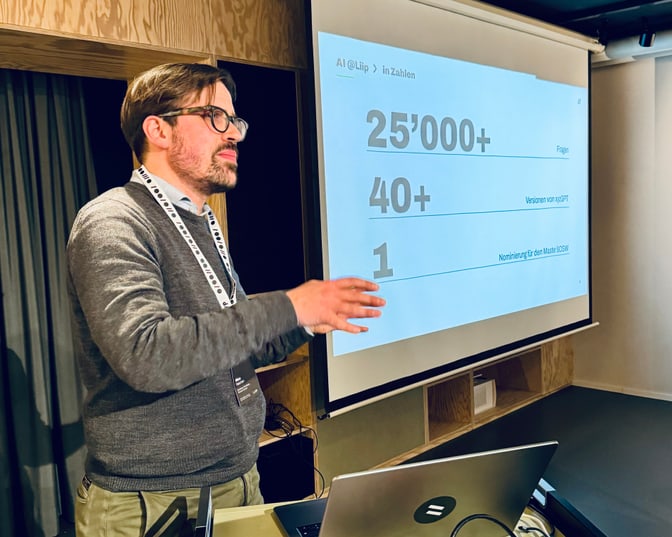In the ever-evolving digital landscape, where artificial intelligence (AI) increasingly influences how businesses operate, the need for leaders to adapt and harness new technologies has never been more critical. Our recent event at the Liip Arena in Zurich highlighted this imperative, focusing on "AI Fluency: Prompt Writing for Leaders and those who want to stay that way," a speech aimed at empowering leaders with the knowledge and skills to leverage AI effectively.
Embracing AI Without Full Understanding
"We don't have to fully understand AI to use it. But we have to get started." Leila Summa, founder of Play To Change and member of the board at Liip, strongly emphasised this belief. Leila has been a digital trailblazer in management for over 25 years and is convinced that integrating AI in the workplace doesn't necessarily replace human labour but provides those adept at prompt writing with a competitive edge in terms of speed, creativity, effectiveness, and quality.
During the session, Leila demonstrated how ChatGPT 4.0, an advanced language model, can be used by decision-makers in their daily routines to maintain and enhance their future success. Her insights shed light on the practical application of prompt writing, a skill that enables leaders to guide AI tools in generating valuable outputs, from crafting emails to producing comprehensive reports.
Four questions to Leila about her experience with prompt writing

Are AI prompts made for tech people only, or is it made for everybody?
The best thing about prompt writing is that it's for everybody. It's also needed that everybody upskills in this regard because AI will not replace you, but people using it better than you will eventually replace you.
How do you choose the right tool for an AI prompt?
To get started, I would not let you be confused by this paradox of choice. You don't have to decide now if you want to use copilot, ChatGPT, or whatever. Just start using one of them. Try things. At some point, you will realise which one works best for you. Or your company might make a decision, and then you just go for that one.
And what if it doesn't work? What if the answer is not what you are looking for?
I often hear that people try something that doesn't work out. Just think back and say garbage in, garbage out. The better the questions and the more you iterate, the more positive reinforcement you give to the machine so that it knows what you want and what you don't want, and the better the result will be.
What is the question you should not ask on an AI prompt tool?
You should not try to find yourself because the probability that you won’t find yourself, as a person, is high.
Where will we be with this technology in five years?
AI will be essential because it will be integrated into all the existing tools. Wherever we are, all tools will have foreign AI in them, and so we will eventually always be using it indirectly.
ChatGPT - The Good, The Bad, and The Ugly
Before heading to the tapas buffet, Max Reichen, Product Owner of LiipGPT, delved into the realistic assessment of ChatGPT, moving beyond the extremes of hype and cultural pessimism. His talk, titled "ChatGPT - The Good, The Bad, and The Ugly," offered a balanced view of the potential and limitations of Large Language Models (LLMs) for organisations. Based on the success of ZüriCityGPT, Max provided a brief overview of how these technologies can be utilised to foster innovation and improve operational efficiencies while also highlighting the ethical considerations, the need for open-source tools, and finally the challenges that accompany their adoption.

This event served as a platform for leaders and aspiring leaders to understand the significance of AI fluency in today's digital era. By mastering prompt writing and recognising the capabilities and limitations of AI tools like ChatGPT, leaders can ensure their organisations remain competitive, innovative, and prepared for future challenges. As AI continues to shape the business landscape, the ability to adapt and leverage these technologies will distinguish the leaders of tomorrow.

